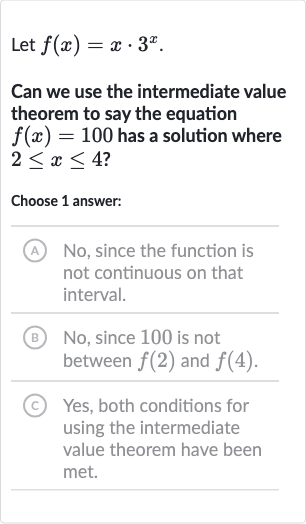AI tutor
Welcome to Bytelearn!
Let’s check out your problem:

Let .Can we use the intermediate value theorem to say the equation has a solution where ?Choose answer:(A) No, since the function is not continuous on that interval.(B) No, since is not between and .(C) Yes, both conditions for using the intermediate value theorem have been met.
Full solution
Q. Let .Can we use the intermediate value theorem to say the equation has a solution where ?Choose answer:(A) No, since the function is not continuous on that interval.(B) No, since is not between and .(C) Yes, both conditions for using the intermediate value theorem have been met.
- Check Continuity: We need to check if the function is continuous on the interval . Since is a product of a polynomial function and an exponential function , both of which are continuous everywhere, is also continuous on the interval .
- Calculate : Next, we need to calculate the value of at the endpoints of the interval to see if lies between and . First, we calculate .
- Calculate : Now, we calculate .
- Apply Intermediate Value Theorem: We observe that is between and . Therefore, by the intermediate value theorem, since is continuous on and is between and , there must be some value in the interval such that .
More problems from Write a quadratic function from its x-intercepts and another point
QuestionGet tutor help
